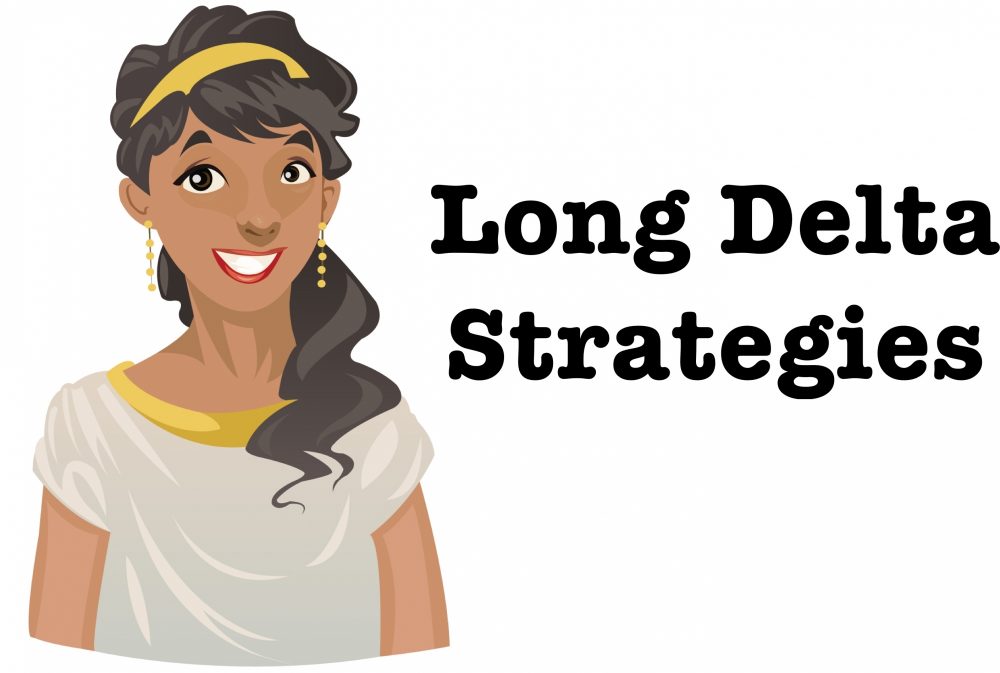If you have ever traded options before, you’ve likely seen a numerical value for "delta" on your trading platform. Delta is simply one of several values options traders refer to as "greeks". These numbers are all being used in calculations behind the scenes to determine what the fair premium for an option contract is. Other greeks include Theta and Gamma, but today we will be considering delta and how you can profit from it.

So, we know delta is a number, and we know that delta corresponds to an options price, but how? Put simply, delta is a ratio. The delta ratio represents how the price of an option will change for every $1 the stock moves . This can be confusing to think about, so let's use an example. Let’s say I purchase a call option on stock ABC. This call option has a delta of 40. If stock ABC moves $1 higher, my call option will gain $40 in value. Similarly, if stock ABC moves down $1 tomorrow, my call option will lose $40 in value.
Options can have a negative delta as well. Put options always have a negative delta, because they gain value when a stock moves downwards. Call options always have a positive delta, because they become more valuable when a stock moves upwards. However, Delta does have a cap. A single call option can have a delta value ranging from 0-100. A put option can have a delta value ranging from -100 to 0. This makes a lot of sense when considering options correspond with 100 shares of underlying stock. Options that are in the money will have a delta closer to 100 or -100. Options that are out of the money have a lower delta value closer to 0. Now that we understand the mechanics of delta, let’s examine how to make profitable trades by using delta as our main vehicle.
Long Delta Strategies vs Other Strategies
Because delta is associated with the direction of a stock's movement, we will look to use delta to profit when we have a strong opinion that a stock will move up or down. This is also called directional trading. A large majority of options traders tend to stray away from directional trading, and instead opt to make most of their money by selling options to collect cash. They then wait for the options they sold to expire worthless, or buy the options back for a lower price. These are called long theta strategies. Good examples of long theta strategies are short put spreads, and iron condors. These strategies usually have a higher probability of being profitable. For what reasons would we want to enter a trade that has a lower chance of being profitable? Certain long delta strategies, such as the long call spread, have notable benefits over long theta strategies.
Benefits of Long Call Spreads
One benefit of long call spreads (aka: long delta strategies) that will be attractive to many new options traders is that it is a much cheaper position to enter than a short put spread. These are both bullish positions that will benefit when the stock rises in value. However, the long call spread will tie up much less of your buying power, and additionally generate more profit from a directional move. Let’s use a real world world example to demonstrate.
American Airlines, stock ticker AAL, reported their earnings after hours this past Friday. Imagine that I am a bullish on AAL this earnings, I think they will surpass expectations and the stock price will rise. A common strategy would be to sell a put spread. The stock is currently trading at $50.49, so I’ll choose some options near the current price. Imagine I sell a 48/50 put spread expiring in two weeks. By all means, this is a decent trade. It has a 60% probability of profit, I’ll collect a 32$ premium, and the stock can stay flat or even go down a bit and I’ll still make money. It has a delta of about 21. The real downside here is that if the stock really trades downwards, my maximum loss is $168. For a new trader with not much capital to work with, that risk/reward profile can be pretty unacceptable. Let’s examine the alternative, a long call spread. I’ll choose similar strikes, a 50/52 call spread, with the same expiry. This trade has a lower probability of profit at 45%, but let's examine the risk/reward profile. The delta is 27, so more money will be made if our directional prediction is correct. We pay an $81 debt, so that is our max loss. The maximum profit on this position is 119$, larger than the maximum profit of the put spread, while boasting a much lower maximum loss as well. So, what's the downside? When trading a short put spread, the stock can go up, flat, or even down a little bit and we can still collect our max profit. The main mechanism of profit in a put spread is typically time decay. With the long call spread, the stock must go up for us to realize our maximum profit. This is why I personally love trading long call spreads around binary events, such as earnings. It puts less money on the line while still giving us a high payout in the event that our prediction is correct.

Another great use of long call spreads is simulating stock positions. Many new investors want to long a stock, but do not have the capital required to make a profit that is worth the investment. If I want to buy 100 shares of a 100$ stock, it would require me to invest 1,000$ in cash. That ties up a lot of buying power, and in small accounts this can lead to less diversified risk. Alternatively, one could buy a call spread that has a delta of 100. An options position with a delta of 100 will act almost exactly the same as purchasing 100 shares, but will require a much smaller initial debt, enabling those with smaller accounts to spread their capital into multiple positions. The main downside with going long a stock with this strategy is that your initial debt will disappear much faster in the event the stock moves against you. On top of this, you will be forfeiting any dividend you would receive if you had held the stock. Options positions also expire, where as stock can be held forever. This creates a limit on the amount of time you can go long on the stock. Finally, long call spreads have a maximum profit whereas stock positions have unlimited profit.
Many options traders will try to avoid long delta strategies in favor of more time tested strategies. Overall, I suggest all traders do their own research, and learn what ways long delta strategies can benefit your portfolio before ignoring them entirely.
Related Topics: Delta, Long Strategies


